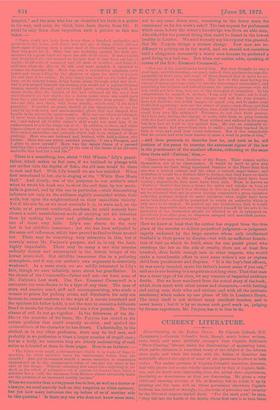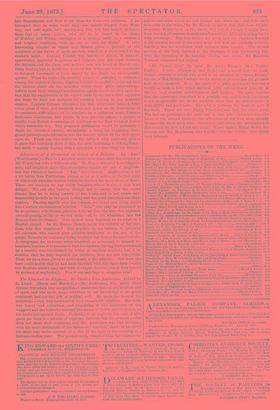CURRENT LITERATURE.
Slave-Catching in the Indian Ocean. By Captain Colomb, R.N. (Longmans.)—Captain Colomb's book, though much better written, more lucid, and more skillfully arranged than Captain Sullivan's. "Dhow-Chasing," labours under the disadvantage of appearing later, when public attention is somewhat weary of the subject of the African slave trade, and when the treaty with the Sultan of Zanzibar has materially altered the aspect of some of the questions involved in both works. The earlier portions of Captain Colomb's narrative, however,, deal with places and events wholly untouched by that of Captain Sulli- van, and are much more interesting than the actual slave experiences, inevitably as monotonous as they are distressing. He gives a very vivid and amusing account of life at Bombay, but he winds it up by pointing. out the same evil on whose prevalence elsewhere Captain Sullivan has insisted so strongly, i.e., the want of provision and security- for the liberated negroes landed there. "For the most part," he says„ "they fall into the hands of the Arabs, whose first care is to turn them, into Mussnlmans, and then to use them for their own purposes. I am Informed that in some cases they are quietly shipped from Bom- bay, and sold again into slavery,—a fate not less happy, perhaps, than that of many others, who are to be found in the slums -of Bombay and Poona, 'strangers in a strange land,' in a wretched and helpless condition, with no one to care for them." A very interesting chapter on Oman and Muscat gives a picture of the condition of the slaves of Arab masters which is a great relief to the reader's mind. Captain Colomb was unable to detect, in manner, appearance, apparent happiness and comfort, any difference between the freeman and the slave, and neither saw nor heard at Muscat any- thing leading him to doubt the truth of the witnesses whose testimony to the good treatment of their slaves by the Arabs he subsequently -quotes. When he relates the terrible scenes of suffering ho witnessed among the captured slavers, Captain Colomb is careful to point out that the dealers share all the miseries which their utter improvidence inflicts upon their unhappy merchandise, and he dwells forcibly upon the fact that the suppression of the export trade by sea can neither suppress the trade by land nor mitigate its existing horrors in any material degree. Captain Colomb discusses the sad, wearisome subject, from every point of view, and certainly does not spare us the knowledge of its enormous difficulties; as he reaches, by a different route, Captain -Sullivan's conclusion, and paints, in less glowing colours, a picture of results from British assumption of territory on the East Coast of Africa -which resembles his. The proposed settlement would be primarily a deli& for liberated slaves ; secondarily, a basis for beginning those grand philanthropic advances into the interior which all the facts press -upon us. Every one who writes on the subject with authority makes it plain that anything short of this, the next best thing to taking Zanzi- bar itself, is merely dealing with a symptom, not attacking the disease.



































 Previous page
Previous page